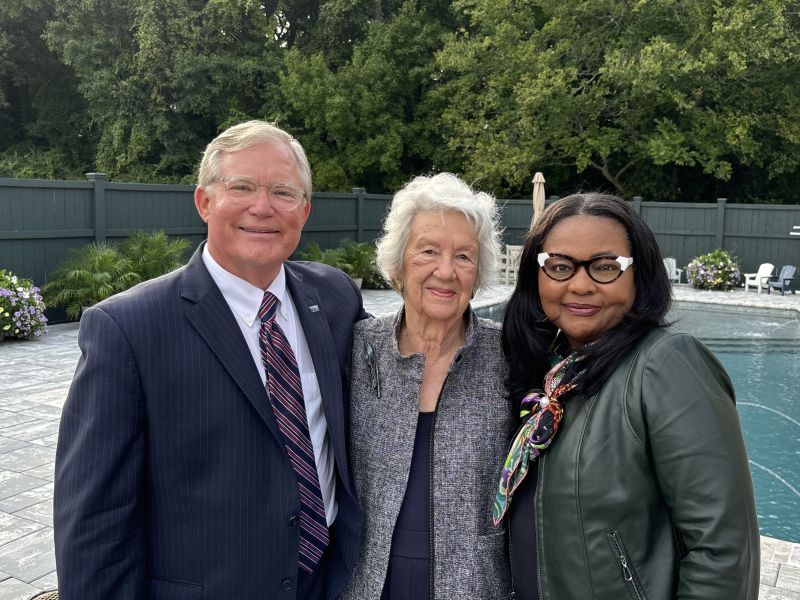Share this Story
Batten Honors College Convocation 2024: Leading from the Margins
Hollins University President underscores shared values and shared affection for BHC Founder Jane P. Batten
University News | September 6, 2024
As Virginia Wesleyan University President Scott D. Miller welcomed everyone to the annual Batten Honors College (BHC) Convocation at the Susan S. Goode Fine and Performing Arts Center, he began by noting the mutual ties that brought Hollins University President Mary Dana Hinton to campus as keynote speaker. “Virginia Wesleyan's unique relationship with Hollins University is based on our mutual benefactor and visionary philanthropist Jane Batten,” said Dr. Miller. “This partnership underscores our shared values and commitment to academic excellence, leadership development, and community impact.” The ceremony represents the completion of the new BHC scholars' orientation, matriculation, and full integration as members of the University community.
As founder of the BHC, Mrs. Batten’s vision has been and continues to be supported by three foundational pillars: environmental stewardship, global engagement, and leadership. “These core values inspire our scholars to explore the world in new and exciting ways, fostering a mindset that encourages curiosity, compassion, and action,” stated Dr. Miller.
With leadership and compassion serving as focal points in her speech, President Hinton gave a speech the new BHC scholars will likely never forget. A member of the prestigious American Academy of Arts and Sciences, Dr. Hinton grew up in poverty. Her book, “Leading from the Margins,” informs her approach to leadership and the message she shared.
“There are times when we define margins quickly and without nuance,” said Dr. Hinton. “’You look different than me. You sound different than I do. You speak a different first language than I do. You worship different than I do.’ The world today loves to emphasize the negative aspects of difference as a means to create boundaries or margins that define good-bad, rich-poor, able-disabled, black-white.
“Rather than diminishing us, I believe that the perspectives, informed by life in the margins, give us new ways of viewing the world, a readiness to question inherent assumptions, and it gives us the tools to give witness to the harm those assumptions do. I will tell you now that I am not the leader I am despite my marginality. I am the leader I am because of my marginality.”
Dr. Hinton went on to paint a picture of an America where first-generation college students make up 56 percent of student bodies, students of color and international students, 49 percent, students above age 25, 34 percent, and LGBTQ 8 percent. And while women comprise 57 percent of the student body, they account for just 36 percent of the full professors, one-third of college presidents, and earn just 82 cents on the dollar compared to men.
“To fit what I thought it meant to be a leader, I quietly packed away my authentic humanity,” said Dr. Hinton. “I chose not to embrace those margins that birthed me. In fact, it was many decades into my life before I realized that those margins that I tried to avoid and hide and discount were not my greatest liability, but instead my greatest strength.”
Having lost her father at age 10 and raised by a mother whose existence was not even acknowledged by a birth certificate, Dr. Hinton shared the sacrifices her mother made, along with the values she instilled, that led her to become a university president. Living in the margins, added Dr. Hinton, “allows us to listen to others and makes us great collaborators.” She further added that navigating a more difficult path has even made her a better strategic planner.
Just prior to the BHC scholars receiving their pins - which represent the mission and ideals of this highly selective program - Dr. Hinton invited the BHC scholars to join her in the margins. “I believe that the liberal arts, like the margins, demands human connection and compels belonging. Lead and create spaces within and outside of the margins where you and your peers are willing to not only open your minds but open your hearts. You have to lead with love in your hearts.”

